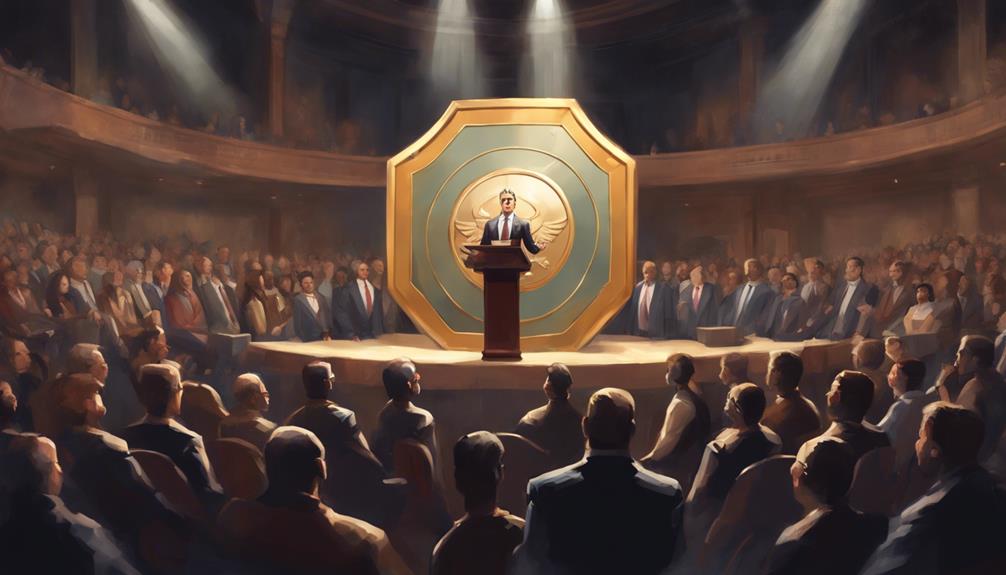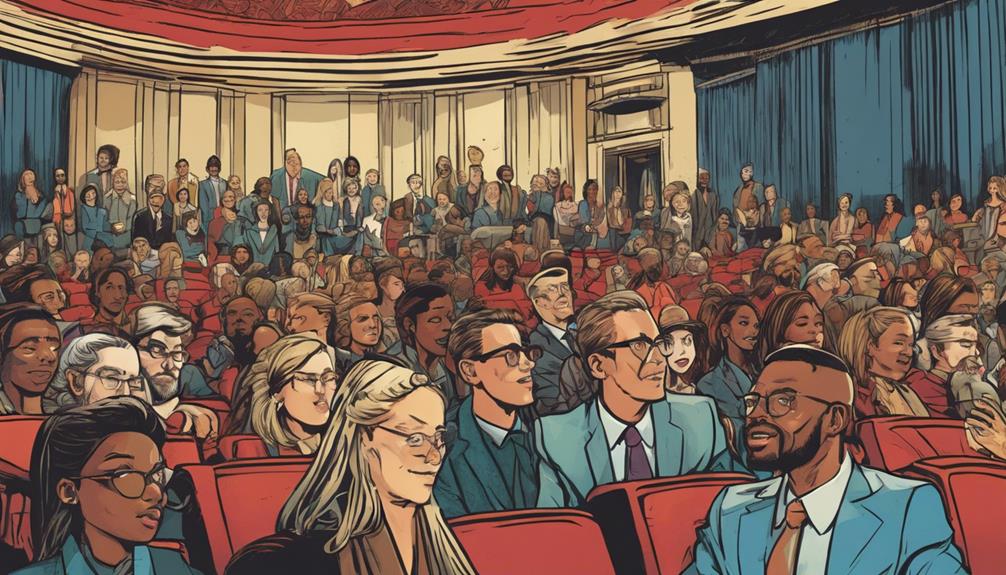Elevate your public speaking game with expert tricks. Control your breathing to stay calm. Acknowledge nervousness openly to ease tension. Opt for minimal notes and strategic pauses for a natural flow. Monitor hand gestures and move purposefully on stage. Utilize visual prompts for impact. Prioritize practice sessions to boost confidence. Rehearse regularly to refine your delivery. Evaluate speaking recordings for improvement. These tricks will enhance your oratory skills and make you a more effective speaker.
Key Takeaways
- Acknowledge nervousness openly and control physical responses.
- Utilize deep breathing techniques for calmness.
- Opt for minimal notes and strategic pauses.
- Monitor hand gestures and stage movement for engagement.
- Practice regularly, evaluate recordings, and tailor sessions for improvement.
Control Your Breathing
How can controlling your breathing positively impact your public speaking performance?
Deep breathing plays an essential role in regulating physical responses triggered by nervousness, such as increased heart rate and sweating. By engaging in deep breathing exercises before speaking, you can calm your body, leading to a sense of peace and control. This practice helps prevent anxiety attacks and promotes a calm state of mind, setting the stage for a more composed delivery.
Moreover, admitting nervousness openly can actually work in your favor. By acknowledging your anxiety, you can alleviate some of the tension both for yourself and your audience. Embracing your nerves and using deep breathing techniques not only helps you manage your emotions but also allows you to project confidence and authenticity during your speech.
Taking control of your breathing is a powerful tool to enhance your public speaking skills and deliver a more impactful and engaging presentation.
Acknowledge Nervousness
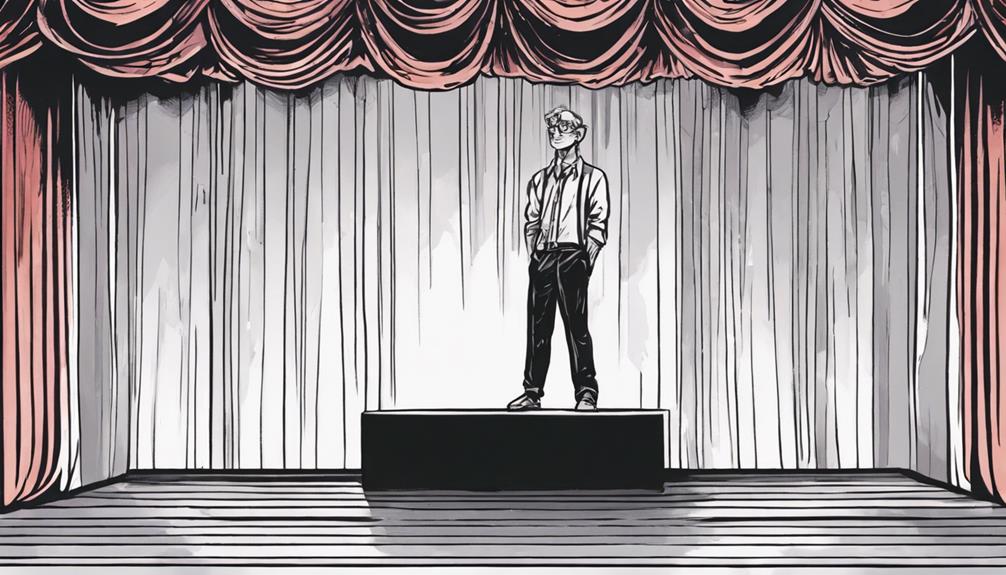
Acknowledging nervousness before a speech can alleviate tension and create a sense of relief for both you and your audience. It's normal to feel nervous before public speaking, and openly admitting this anxiety can actually help in improving your public speaking skills. When you acknowledge your nervousness, you are taking the first step towards managing it effectively. Here is a table summarizing the benefits of acknowledging nervousness:
| Benefits of Acknowledging Nervousness |
|---|
| Creates a sense of relief |
| Eases tension for the speaker |
| Helps in moving past anxiety easily |
| Enhances peace and confidence |
| Allows control of physical responses |
Opt for Minimal Notes
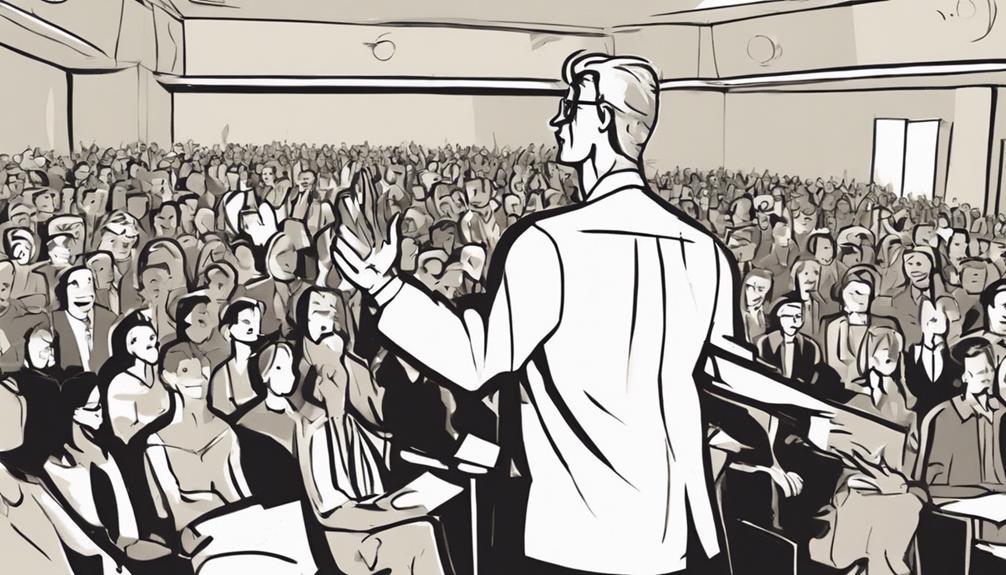
When giving a speech, consider using minimal notes with engaging prompts to stay on track and connect better with your audience.
Instead of detailed scripts, opt for one- or two-word prompts that keep you focused and maintain a natural flow in your delivery.
Note-taking Strategies
Consider utilizing minimal notes with brief prompts to enhance your public speaking skills. By incorporating this note-taking strategy, you can maintain eye contact, improve your body language, and boost audience engagement.
Here's why minimal notes with prompts are beneficial:
- Staying on Track: Using one- or two-word prompts helps you stay focused on your message without getting lost in extensive notes.
- Maintaining Engagement: Minimal notes allow you to connect with your audience more effectively, as you aren't constantly looking down to read from a script.
- Confident Delivery: With minimal notes, you can deliver your speech more confidently and authentically, as you aren't reliant on reading word-for-word.
- Enhanced Impact: By avoiding excessive reliance on notes, you can increase the overall impact and effectiveness of your public speaking presentation.
Engaging Prompts
Opt for minimal notes with engaging prompts to enhance your public speaking skills and captivate your audience effectively. Using brief prompts instead of detailed notes can help you stay focused and connected with your audience.
Visual prompts, such as images or graphs, can reinforce your message and make key points more memorable. These aids not only enhance understanding but also provide visual breaks for your audience, keeping them engaged throughout your speech.
When incorporating visual aids like props or slides, remember that less is often more. A cluttered slide can distract from your message, so opt for simple visuals that emphasize your main ideas.
Embrace Strategic Pauses
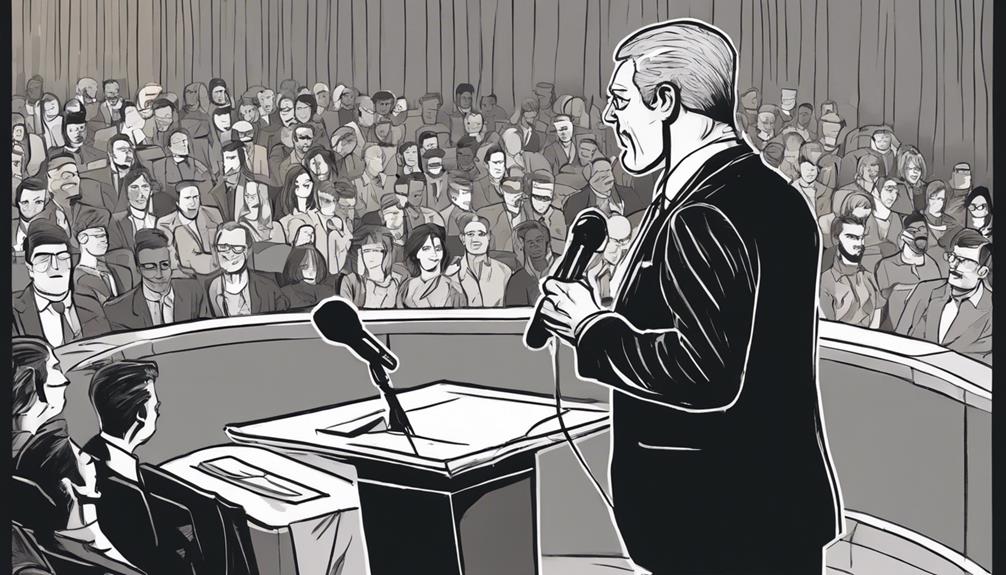
When delivering a speech, remember that the timing of your pauses can greatly impact your message.
Purposeful silence can create a powerful effect, allowing your audience to reflect on your words.
Consider how strategic pauses can influence the overall impact on your listeners.
Timing of Pauses
Strategic pauses in public speaking play a pivotal role in emphasizing key points and building anticipation among your audience. Mastering the timing of pauses is essential to effectively deliver your message.
Here are some tips to help you make the most of your pauses:
- Vary the Length: Adjust the duration of your pauses based on the importance of the message. Longer pauses can add weight to impactful moments.
- Allow Reflection: Well-placed pauses give your audience time to absorb information and contemplate your words, enhancing their understanding and retention.
- Create Suspense: Pausing before a significant statement can create suspense, capturing the audience's attention and preparing them for the upcoming message.
- Enhance Impact: Mastering the timing of your pauses can elevate the overall effectiveness of your speech, making it more engaging and memorable.
Purposeful Silence
Embrace the power of intentional silence in your public speaking to enhance the impact of your key messages and maintain audience engagement. Strategic pauses play an essential role in capturing your audiences' attention and emphasizing the message you want to convey.
By incorporating intentional silence at key moments, you allow your listeners time to absorb and reflect on the information presented, reinforcing the importance of your ideas.
Intentional silence isn't merely a break in speech; it's a powerful tool that can create anticipation, build suspense, and draw attention to critical points within your presentation. These well-timed silences serve to highlight the most important aspects of your message, guiding your audience towards a deeper understanding and appreciation of your content.
Embracing intentional silence demonstrates your confidence and control as a speaker, adding depth and impact to your delivery. Utilizing strategic pauses effectively can greatly enhance the overall effectiveness of your speech, ensuring that your message resonates with your audience long after you have finished speaking.
Impact on Audience
To captivate your audience and reinforce the importance of your message, harness the impact of strategic pauses in your public speaking delivery. Strategic pauses play an essential role in making your speech impactful and engaging.
Here's why incorporating strategic pauses can greatly benefit your audience:
- Enhance Audience Engagement: Strategic pauses allow key points to resonate with your audience, making them feel more connected to your message.
- Maintain Control: Pausing strategically gives you the opportunity to gather your thoughts, maintain control over the flow of your speech, and guide the audience's attention effectively.
- Emphasize Important Information: Well-placed pauses can highlight crucial details, ensuring that your audience grasps the significance of key points.
- Convey Confidence and Mastery: Embracing pauses in your speech demonstrates confidence, poise, and a deep understanding of your material, leaving a lasting impression on your audience.
Monitor Hand Gestures
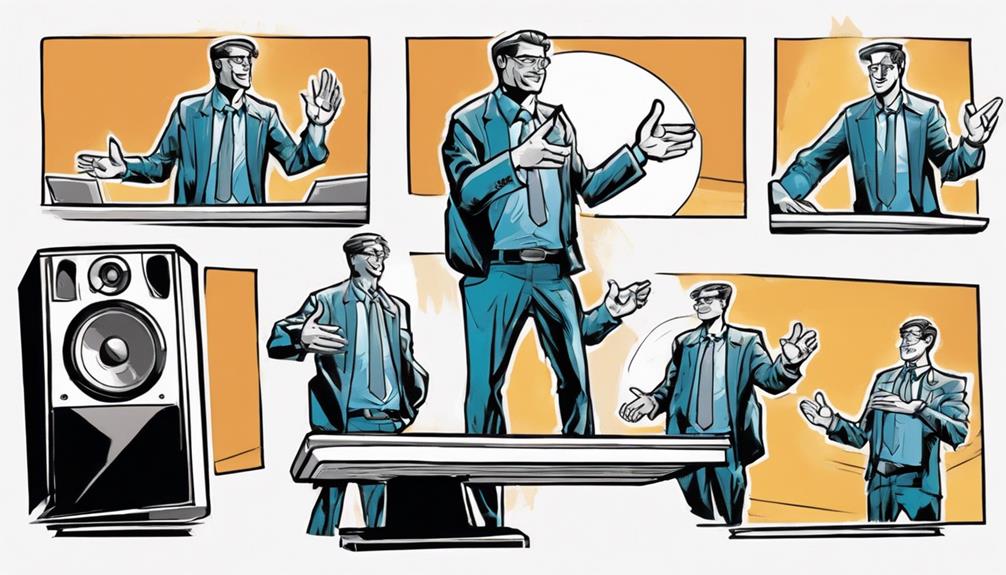
Keep a vigilant eye on your hand gestures to make certain they complement your speech effectively. When speaking in public, your hand movements can either enhance or detract from your message. Excessive or erratic hand gestures may divert the audience's attention from what you're saying, leading to communication breakdown.
To avoid distractions, aim to use purposeful gestures that align with the content of your speech. Slowing down the speed of your hand movements can help convey your points more clearly and effectively. Remember, the goal is to emphasize key ideas through your gestures, not overshadow them.
Balance Movement on Stage
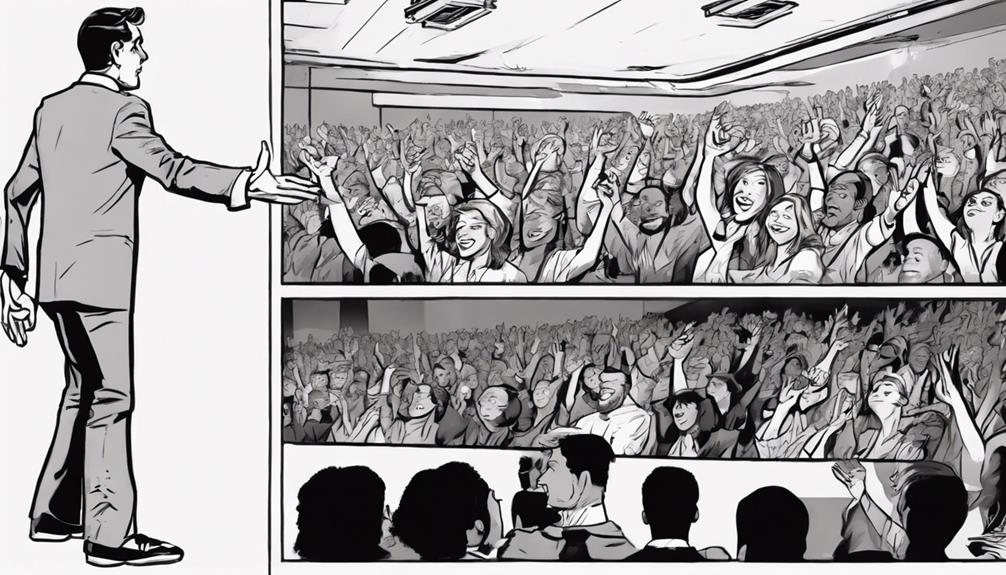
How can you effectively balance movement on stage to maintain audience engagement and focus during your speech? Controlled movement on stage can greatly enhance your speech delivery by engaging the audience while ensuring their attention remains on your message. Here are some tips to help you strike the right balance:
- Moderate movement: Engage the audience with purposeful movement that complements your speech.
- Avoid excessive pacing: Walking back and forth can distract from your message, so try to limit excessive movements.
- Use strategic positioning: Walking away from the podium at key moments can help maintain audience interest and focus on your speech.
- Enhance impact: Controlled movement can add depth to your speech, making it more memorable and impactful.
Utilize Visual Prompts

Maintaining audience engagement during your speech can be effectively achieved by utilizing visual prompts such as images and graphs. Visual aids not only enhance your presentation but also help in emphasizing key points and guiding your audience through the content.
By incorporating props like a glass of water strategically, you can provide breaks and draw attention to important details without shifting the focus entirely to yourself. These visual prompts serve as valuable tools to keep your audience attentive and reinforce vital information.
They elevate the sophistication of your presentation and make complex ideas more digestible for your listeners. Remember, the effective use of visual aids can't only enhance audience understanding but also create a more dynamic and engaging atmosphere for your speech.
Prioritize Practice Sessions
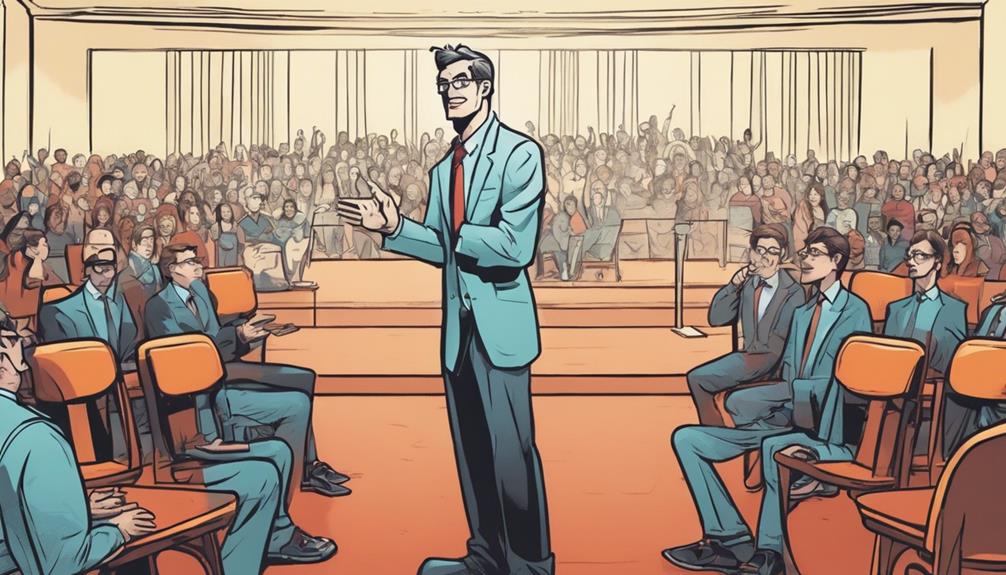
To excel in public speaking, prioritize regular practice sessions to enhance your skills and confidence. Consistent rehearsals not only build your comfort with public speaking but also refine your speech delivery, making you more effective and engaging.
Here's how practice sessions can benefit you:
- Increased Confidence: The more you practice, the more confident you become in your ability to deliver a speech effectively.
- Improved Comfort: Regular practice helps you become more comfortable with speaking in front of an audience, reducing anxiety.
- Speech Delivery Refinement: Rehearsing multiple times allows you to fine-tune your delivery, ensuring a smooth and impactful presentation.
- Enhanced Performance: Familiarity with the material through consistent practice enhances your overall performance, making you more persuasive and credible.
Evaluate Your Speaking Recordings

Consider reviewing your speaking recordings as a valuable tool for self-assessment and improvement in public speaking skills. Watching yourself speak allows you to identify areas in speech delivery, body language, and tone that may need refinement.
Through self-assessment, you can pinpoint speech habits, nervous tics, and other aspects that impact your presentation. By recognizing patterns in your speech delivery, you can tailor targeted practice sessions to focus on these specific areas for improvement.
Recording your speeches provides insights into your pacing, clarity, and overall presentation style, helping you understand how you come across to your audience. Utilizing these recordings for feedback enables you to hone your public speaking skills effectively and enhance your performance on stage.
Embrace the opportunity to learn from your recordings and leverage them as a powerful tool in your journey to becoming a more confident and engaging speaker.
Frequently Asked Questions
What Are 10 Successful Public Speaking Tips?
You want to ace public speaking? Practice deep breathing, admit nerves, use visuals, keep notes minimal, and master eye contact. Boost confidence, engage your audience, and deliver a memorable speech with these ten successful tips.
How Can I Improve My Oratory Skills?
To improve your oratory skills, practice deep breathing for calm, use vocal range for engagement, master nonverbal cues for confidence, add surprises for attention, and show your authentic self to connect with the audience and boost speaking prowess.
What Are the 5 Ways to Become a Better Public Speaker?
To become a better public speaker, practice regularly for confidence. Engage your audience with vocal variety and gestures. Use visual aids strategically. Seek feedback to refine skills. Connect with your audience for impactful speeches.
What Are 3 Tips for Public Speaking?
To become a better public speaker, practice deep breathing to manage nerves, minimize notes for better engagement, and use strategic pauses to reinforce points. These tips help you connect with your audience effectively and deliver a memorable speech.
What Can I Learn from YouTube Speakers to Boost My Public Speaking Skills?
By watching youtube orators redefining online speaking, you can learn valuable techniques to boost your public speaking skills. You can observe their body language, vocal variety, and storytelling ability to engage with the audience. Additionally, you can learn how to structure your speech and deliver it with confidence and authenticity.
What are the Key Techniques for Improving Public Speaking Skills?
Are you looking to boost your public speaking skills? Try these 8 tricks to inspire speaking. Practice deep breathing to calm nerves, maintain eye contact to engage the audience, and use vocal variety to keep them interested. Don’t forget to rehearse and seek feedback to continuously improve your speaking abilities.
Conclusion
So there you have it – 9 tricks to level up your public speaking skills. Remember, practice makes perfect!
Did you know that studies have shown that 75% of people fear public speaking? But don't let that statistic hold you back.
With these tips and some dedicated practice, you can conquer your fear and become a confident and engaging speaker.
Keep at it, and watch your oratory skills soar!


